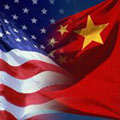| NSPM in English | |||
US Military Threats Directed against China |
 |
 |
 |
| petak, 20. avgust 2010. | |
|
(China Daily, August 12, 2010)
The US should refrain from provoking China through unnecessary military drills and respect its maritime concerns. The recent decision by the United States to involve its nuclear powered aircraft carrier USS George Washington in the scheduled joint naval drills with the Republic of Korea (ROK) in the Yellow Sea will further compromise its security strategy in East Asia. Pentagon spokesman Geoff Morrell said last Thursday that the Japan-based vessel would participate in the exercise although he did not provide the exact dates. If so, this would be a fresh provocation following a series of joint US-ROK activities that have caused tensions in East Asia. Washington has held intensive military exercises with allies in the Pacific Ocean and Northeast and Southeast Asia over the past months, quite close to China and its surrounding region. Despite its routine military drills with certain countries in the region in previous years, the US-led exercises this year have drawn more concerns among regional members because of the unequivocal motive behind the exercises and the sensitivity of their locations. At a superficial level, the latest US-ROK military drill is being targeted at the Democratic People's Republic of Korea (DPRK) for its alleged torpedoing of the ROK warship Cheonan in March that caused the deaths of 46 ROK sailors. By conducting this joint maneuver with the US, the ROK is attempting to maintain high-pressure over the DPRK. At the same time, the US has also exposed its intention, using the exercises as a pretext to express its dissatisfaction toward Pyongyang and to show its military strength. The large-scale military exercise is intended to send an unambiguous message to other regional countries, including China, that the US is still the strongest military power in the world and that Washington's military dominance in Northeast Asia, and the wider Asia-Pacific region, cannot be challenged. Pentagon's announcement of the joint military exercise essentially sends an unspoken message to the outside world that the US is capable of doing whatever it wants in the region and will certainly do it. The Chinese government has repeatedly expressed its concerns over the US move through various channels. The Chinese people have also expressed their indignation at the drills. As the world's sole superpower with an unchallenged armed force, no single nation in the world can stop the US from conducting such activity, but Washington will inevitably pay a costly price for its muddled decision. Washington's show of military strength by mobilizing a fleet comprising a nuclear-fuelled aircraft carrier and other warships close to China's maritime border obviously contravenes the consensus that heads of both nations had reached on an "all-round, active and constructive" partnership. Offending Chinese people is not in the fundamental interest of the US. Any activity aimed at pushing a country with a 1.3-billion populace with enormous potential would be inadvisable. When the long-established global strategic pattern changes to the US' disadvantage, Washington's adherence to the Cold War mentality and its excessive dependence on military means to resolve international disputes will lead the superpower to bigger strategic setbacks. The US' stubborn adherence to its decision to dispatch aircraft carriers to the waters off China also exhibits the intractable "security dilemma" as far as bilateral ties are concerned. If this is not eliminated, it will be unfavorable to regional peace, security and prosperity. How to extricate the two countries from this deep-rooted security dilemma, especially in the maritime arena, will not only determine how stable and healthy the relationship will be, but is also relevant to the stability of Northeast Asia and the Asia-Pacific region. It is up to the US to take some initiatives to change its long-established position for the sake of better bilateral ties. Washington should discard its deep-rooted Cold War mentality and concepts of maritime hegemony. It should also not consider China's normal military buildup, especially that of its naval forces, as a challenge or threat to itself. Any blockade or containment will fail to stop China's military from advancing and making strides in the region, an irreversible move aimed at safeguarding its national interests and contributing to regional and world peace, security and prosperity. The adoption of a cooperative approach to cope with the world's common security challenges, rather than embracing zero-sum games, will help promote healthy interaction between the two countries' military and shape stable and harmonious development of bilateral ties. At the same time, China should continue to stick to its established national strategy of pushing for a harmonious world and not pursuing a hegemonic position in world affairs. While maintaining its national interest, China should actively contribute to world peace and development. To ease mutual strategic and security misgivings, clear strategic exchanges between China and the US are badly needed. China should send an unambiguous message to the US that it would not pursue maritime hegemony either in the region or globally, and that the country's normal military development will contribute to world peace and stability. And, on its part, the US should earnestly assume its responsibility as a superpower to pursue world peace and exercise caution and restraint in showing off military forces. There is wide scope for mutual cooperation between the two naval forces, especially in shared efforts to deal with non-traditional security challenges, if the two powers really want to avoid confrontation. Yang Yi is a Rear Admiral and former director of the Institute for Strategic Studies at the People's Liberation Army National Defense University. |
Od istog autora
Ostali članci u rubrici
- Playing With Fire in Ukraine
- Kosovo as a res extra commercium and the alchemy of colonization
- The Balkans XX years after NATO aggression: the case of the Republic of Srpska – past, present and future
- Iz arhive - Remarks Before the Foreign Affairs Committee of the European Parliament
- Dysfunction in the Balkans - Can the Post-Yugoslav Settlement Survive?
- Serbia’s latest would-be savior is a modernizer, a strongman - or both
- Why the Ukraine Crisis Is the West’s Fault
- The Ghosts of World War I Circle over Ukraine
- Nato's action plan in Ukraine is right out of Dr Strangelove
- Why Yanukovych Said No to Europe

.jpg)








 US Military Threats Directed against China: Cold War Mindset Harms Peace
US Military Threats Directed against China: Cold War Mindset Harms Peace












